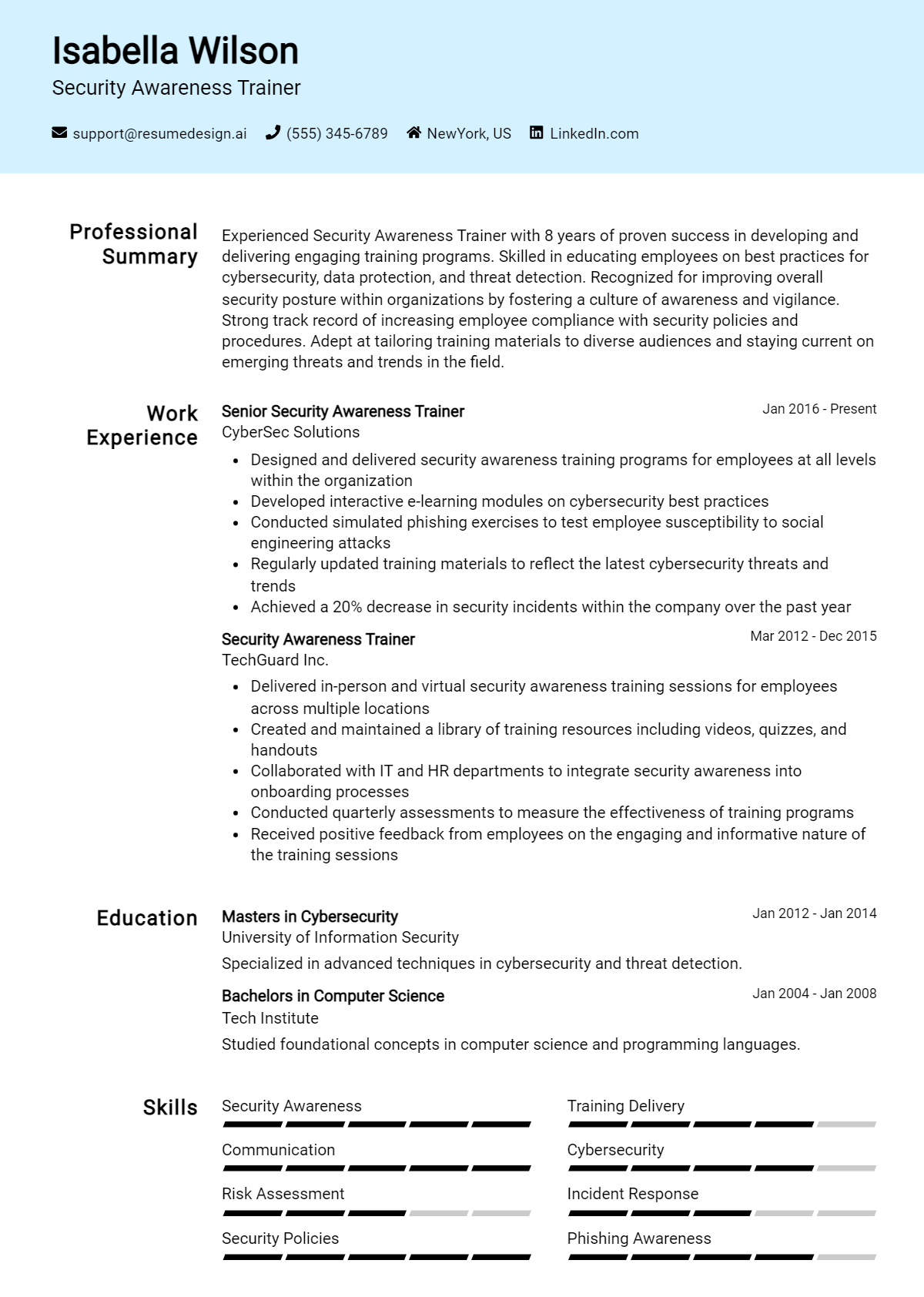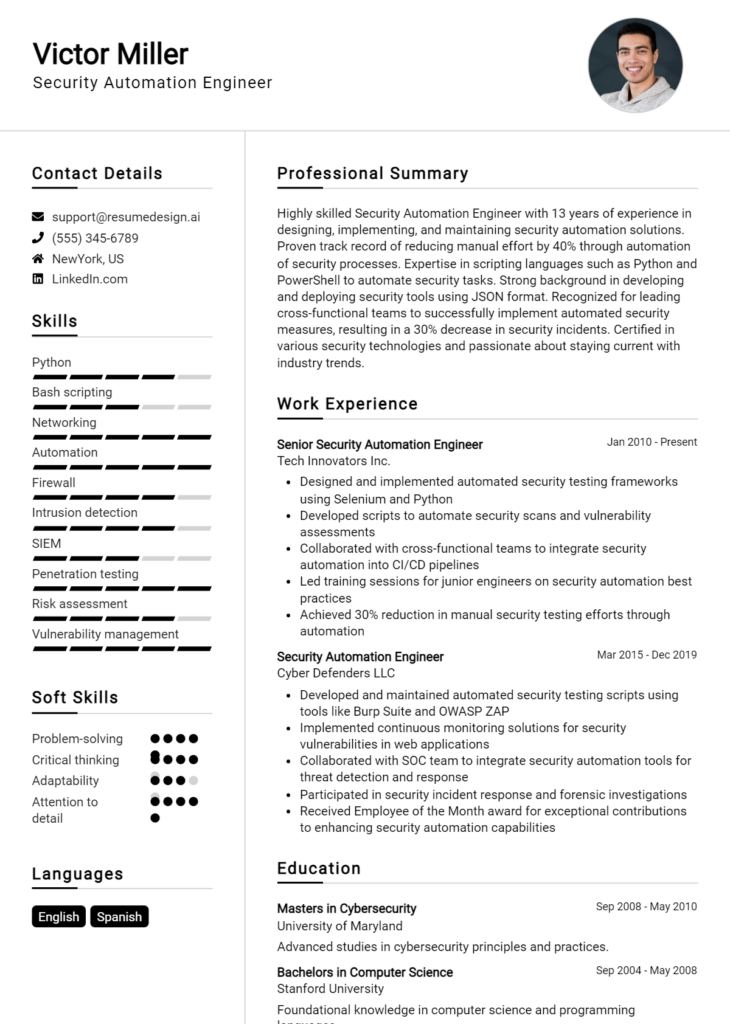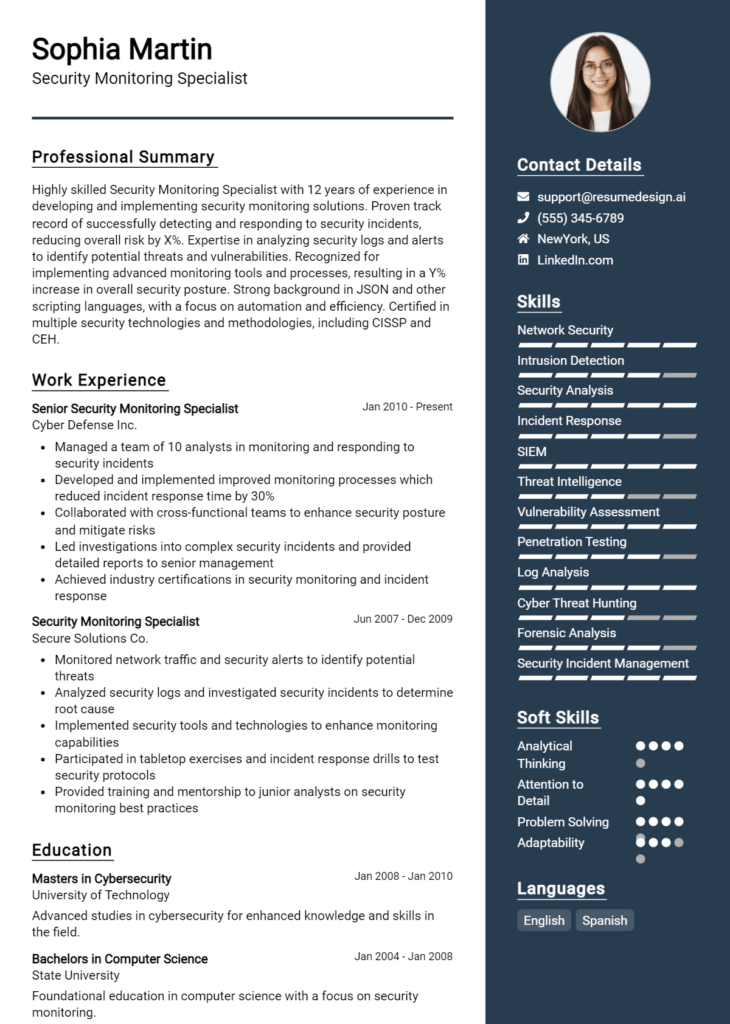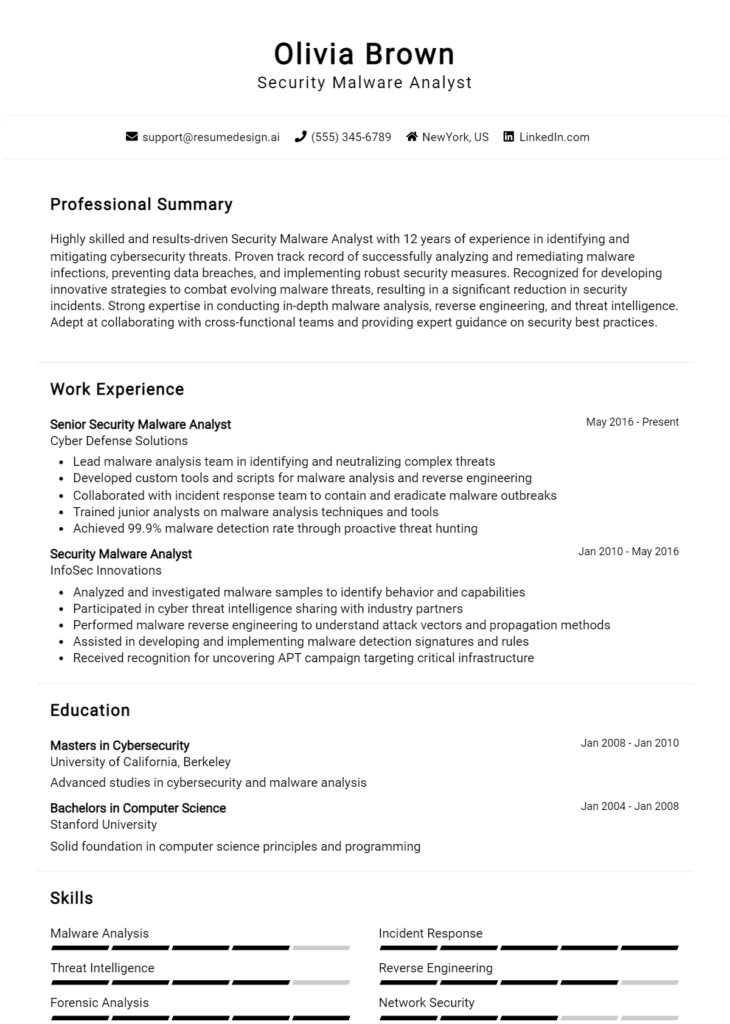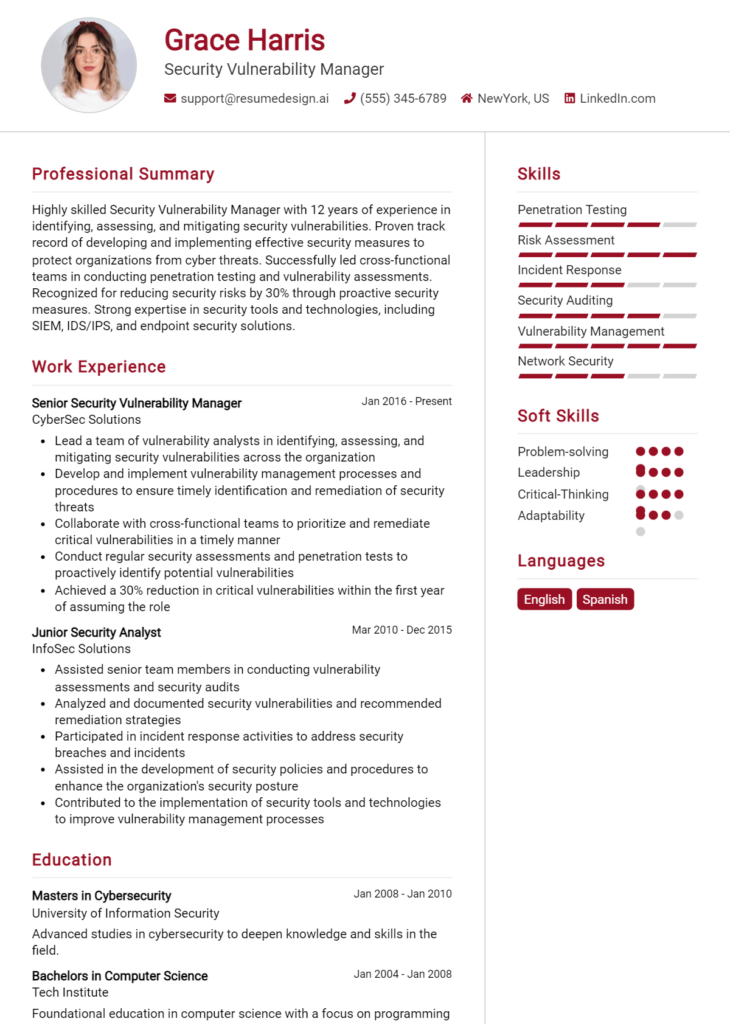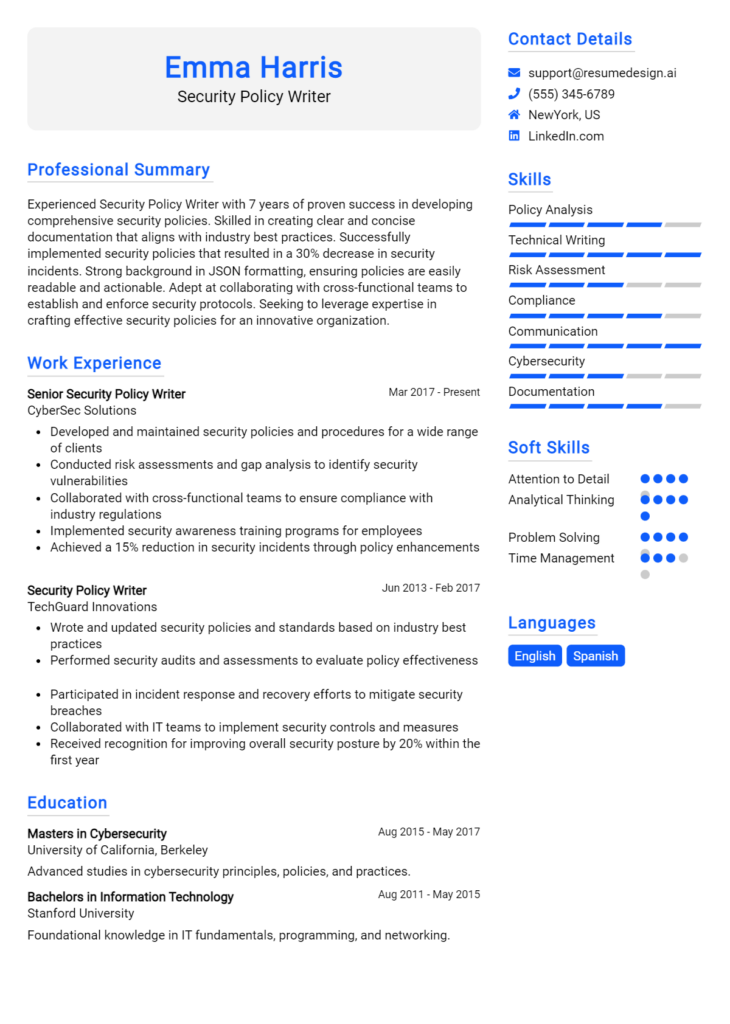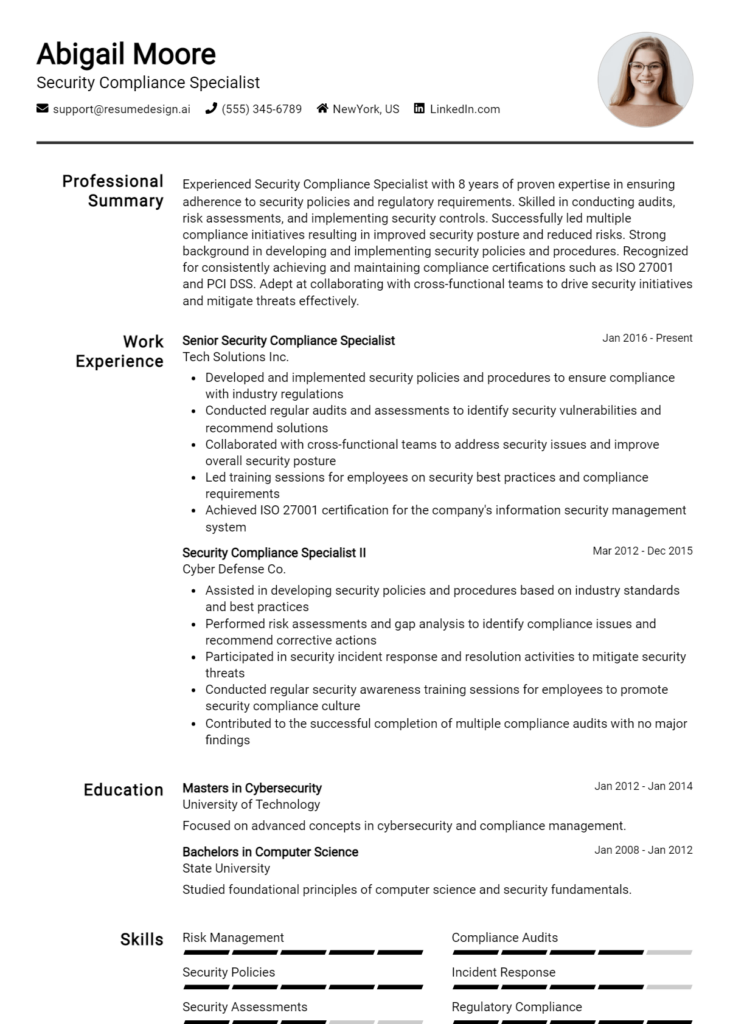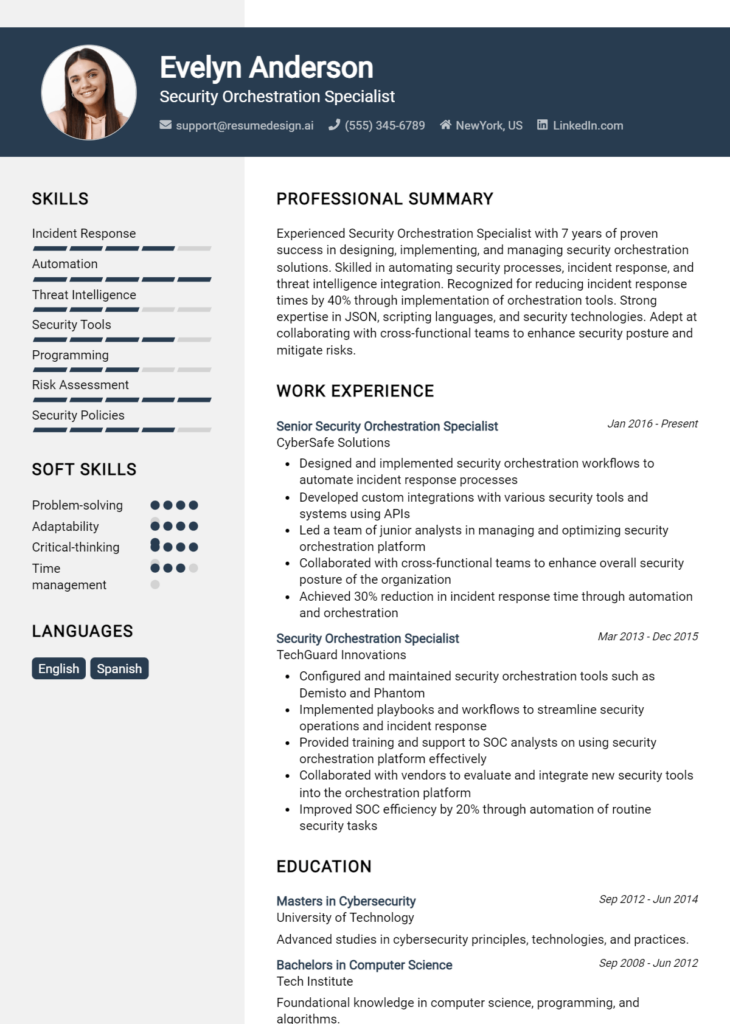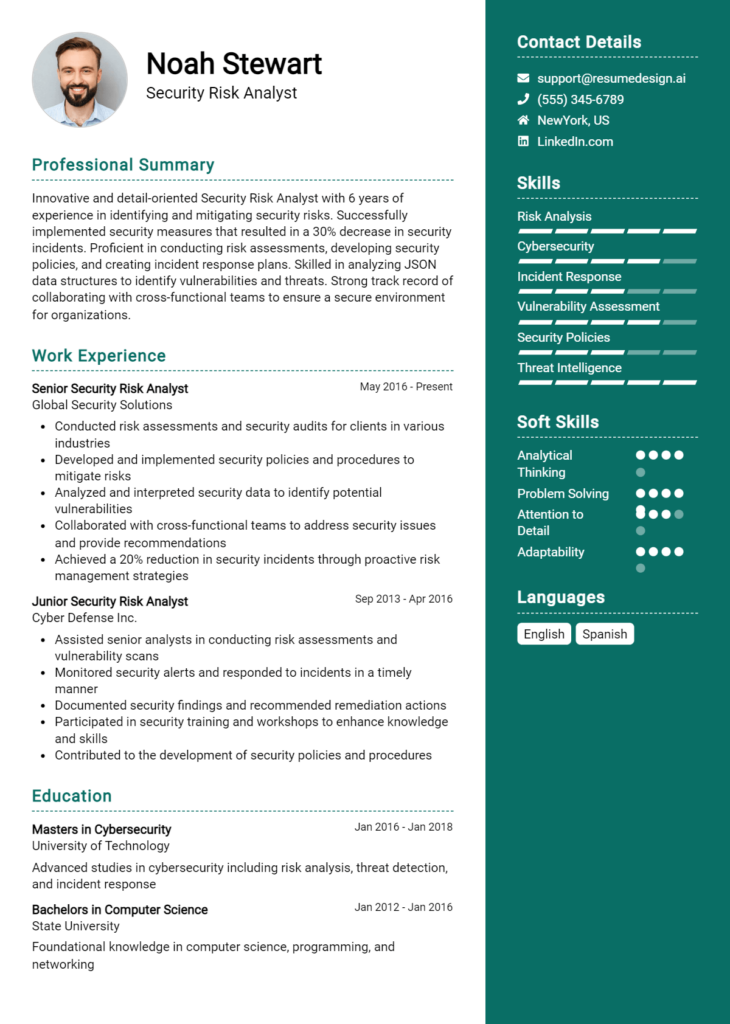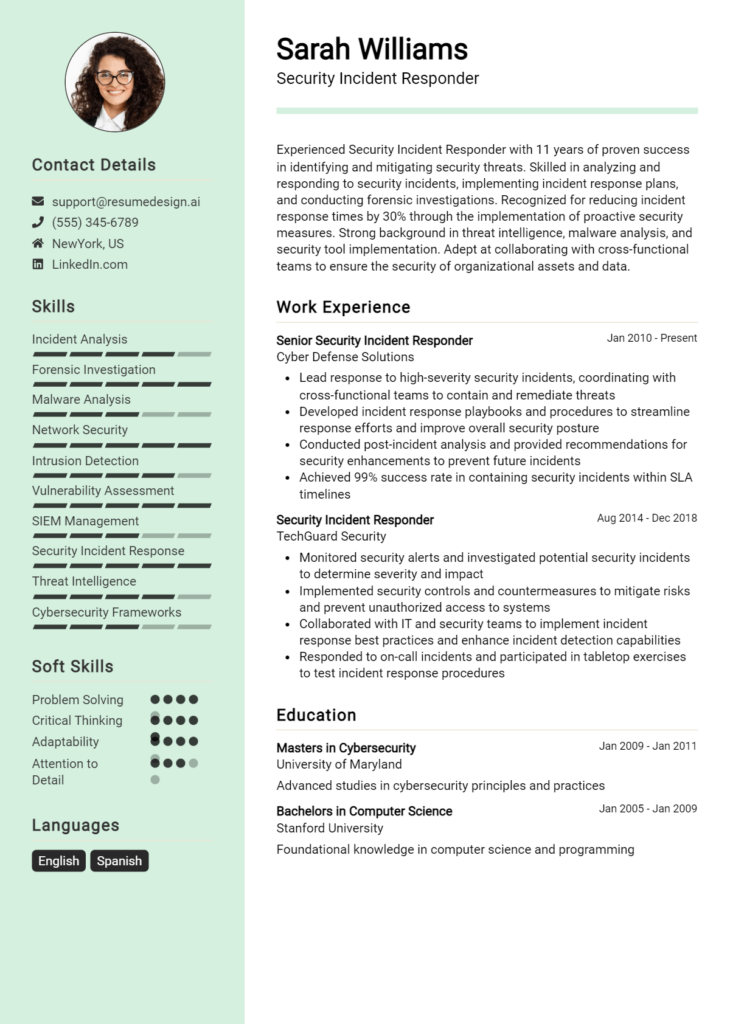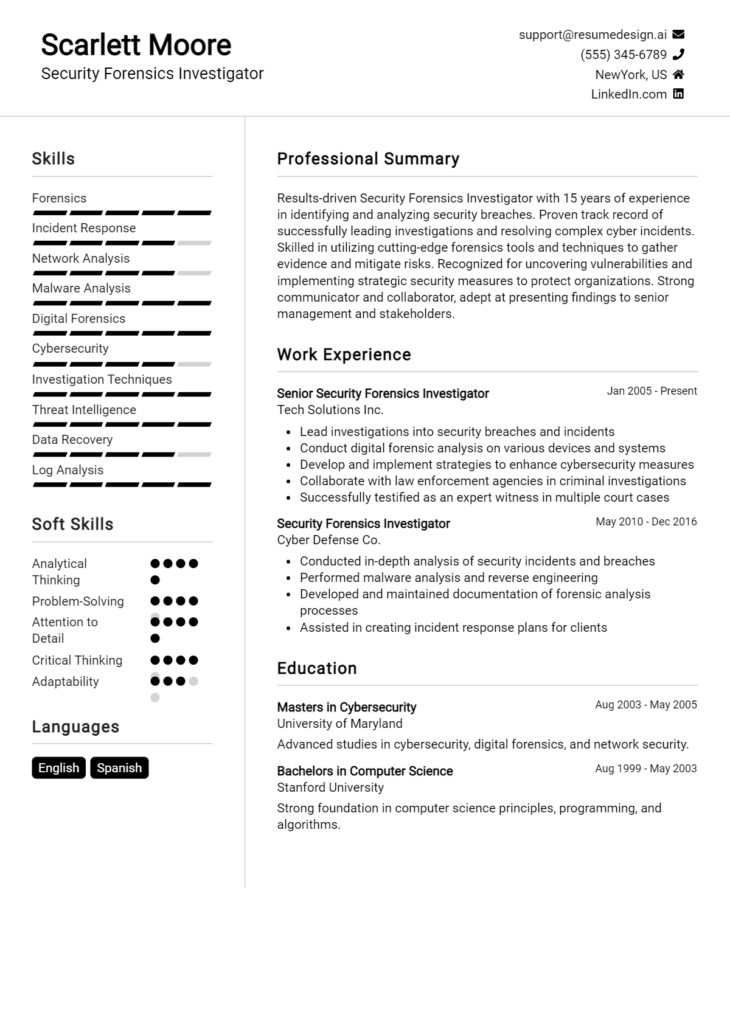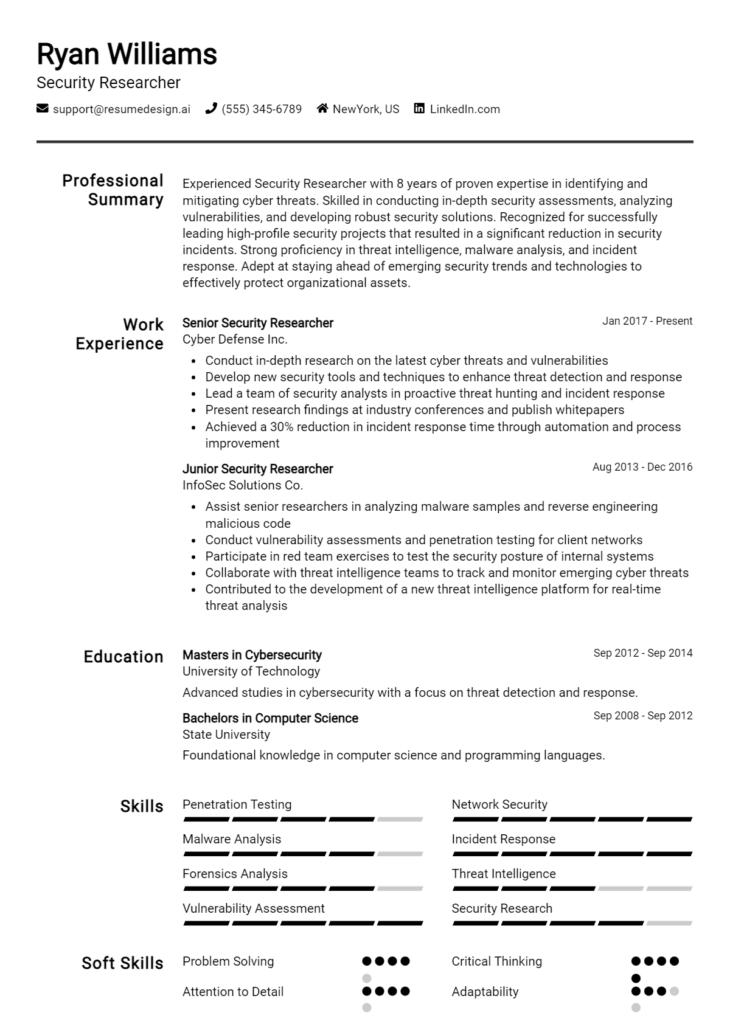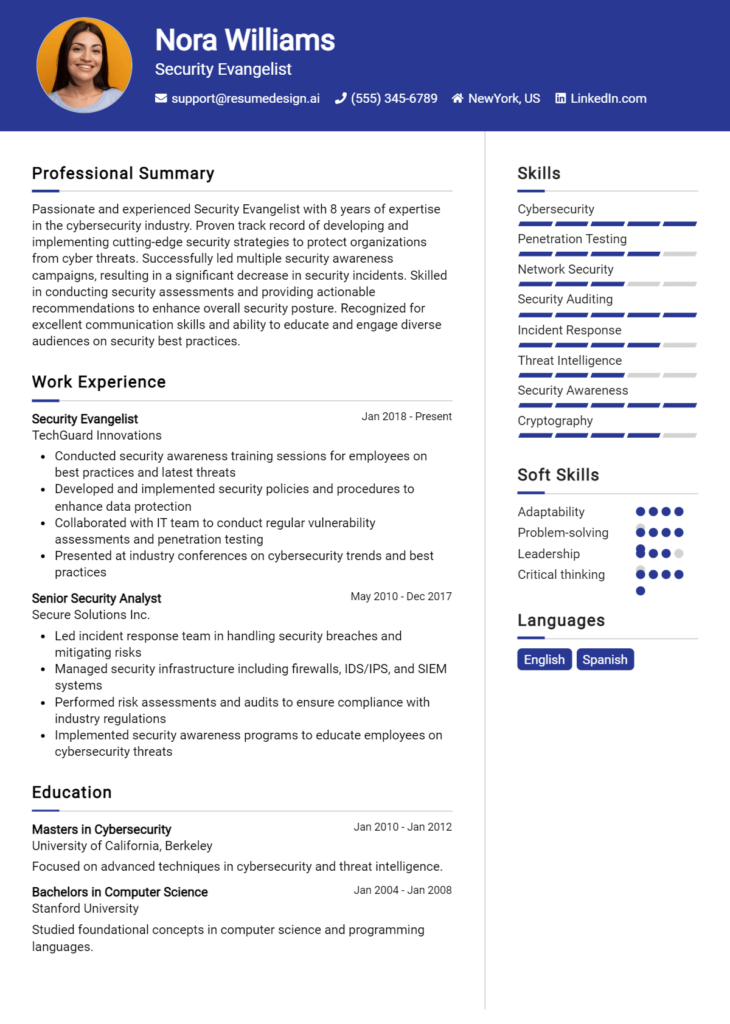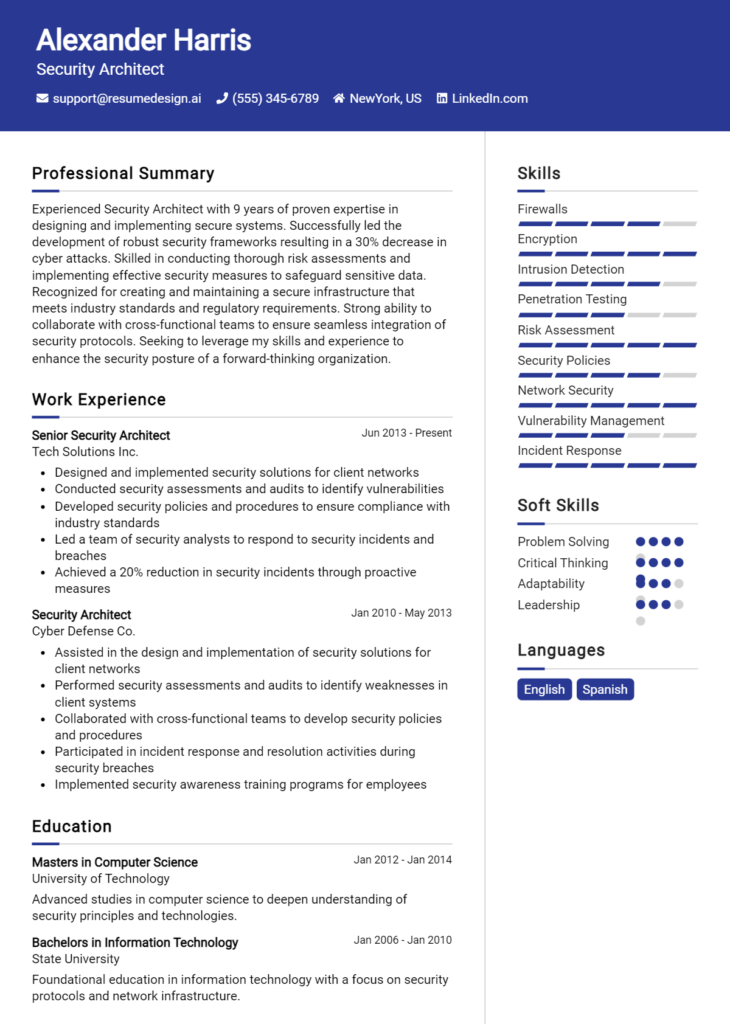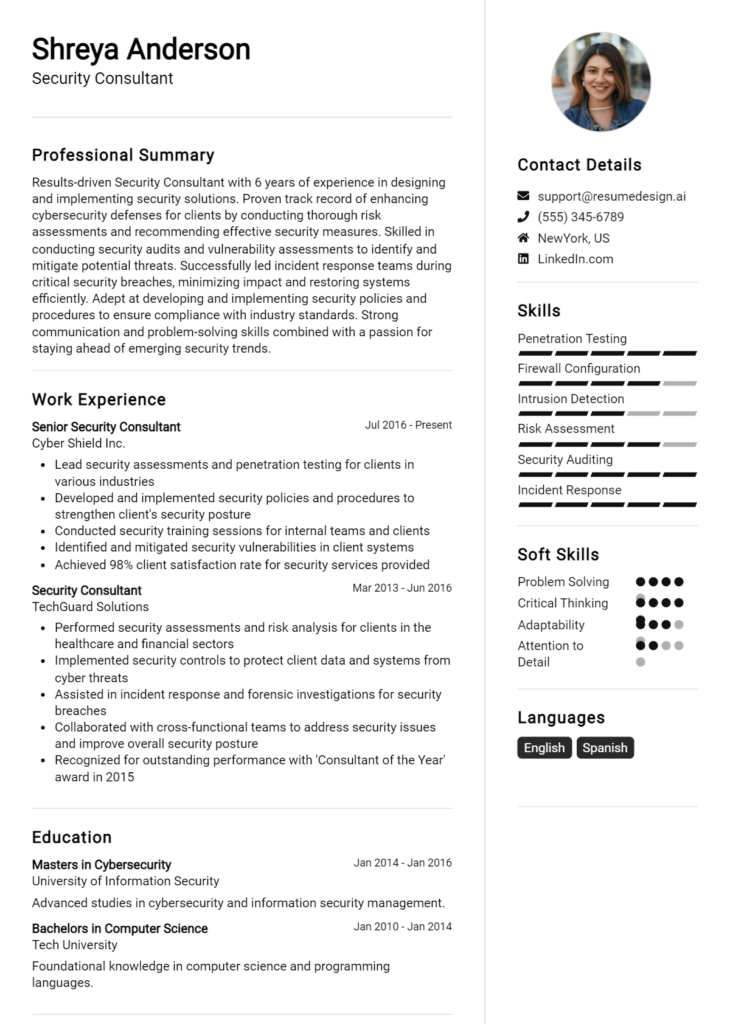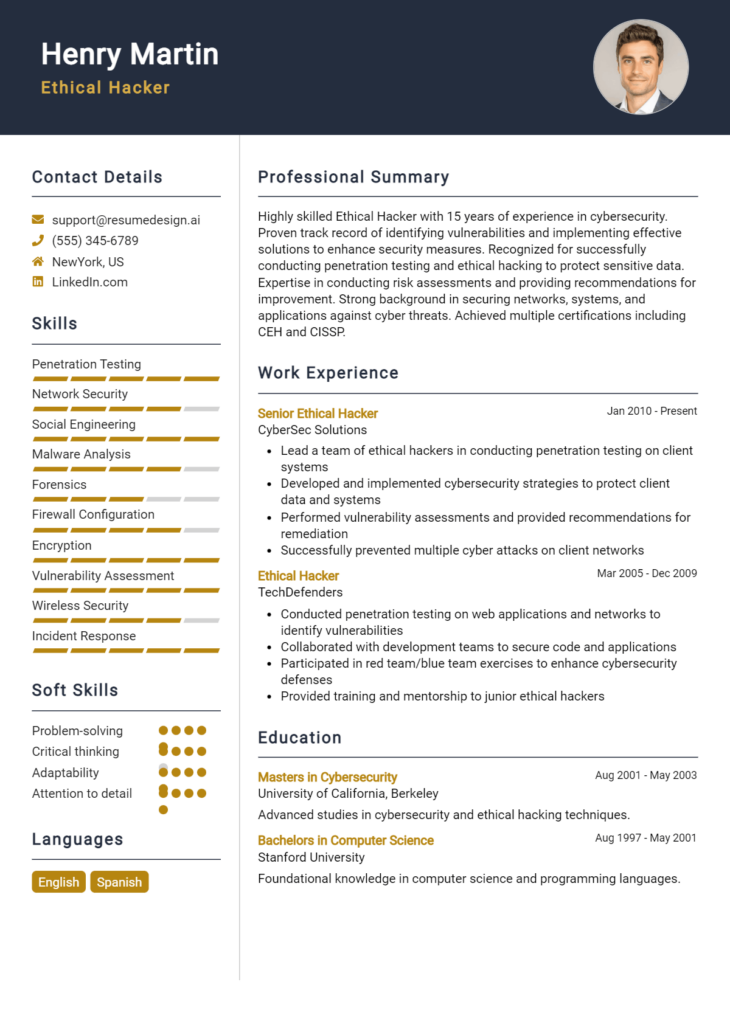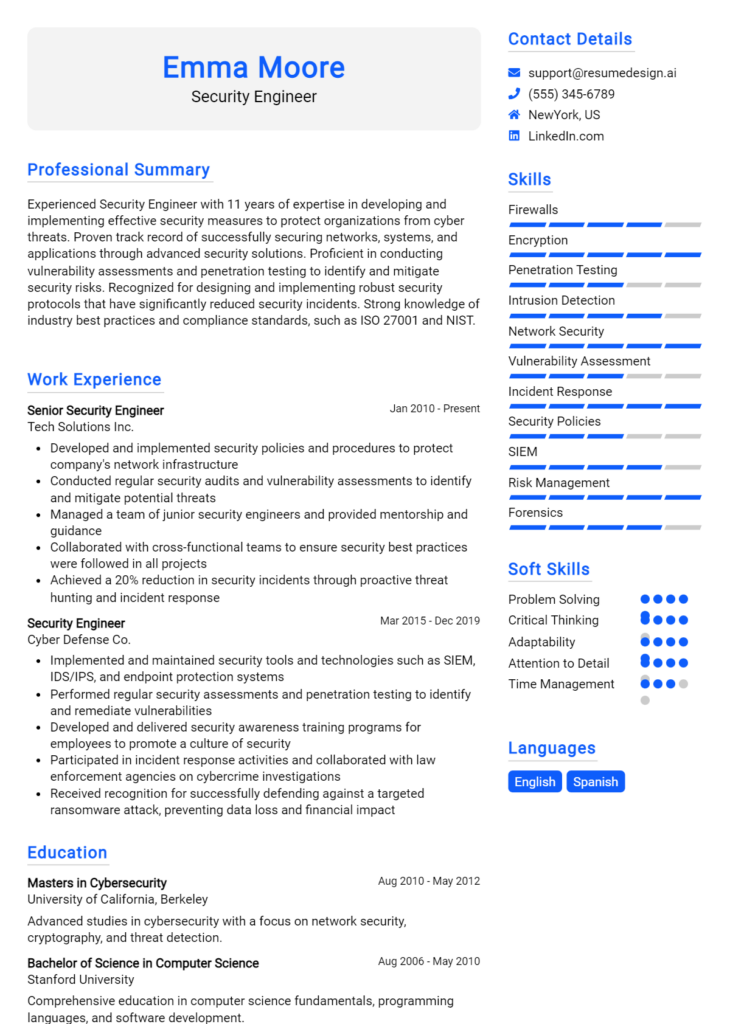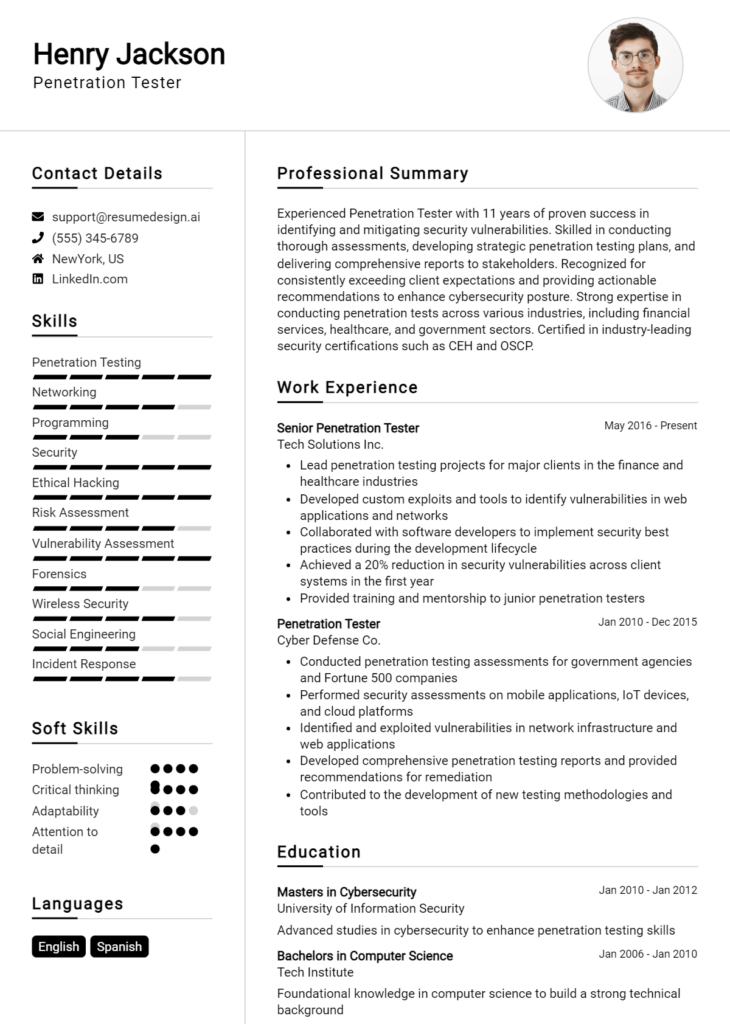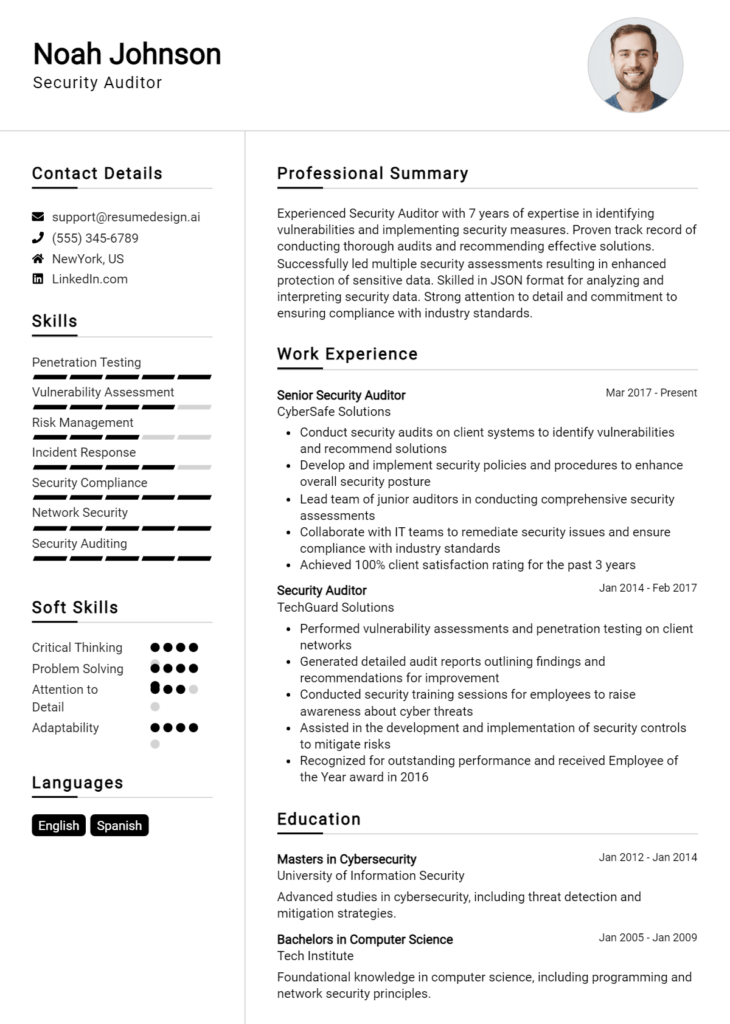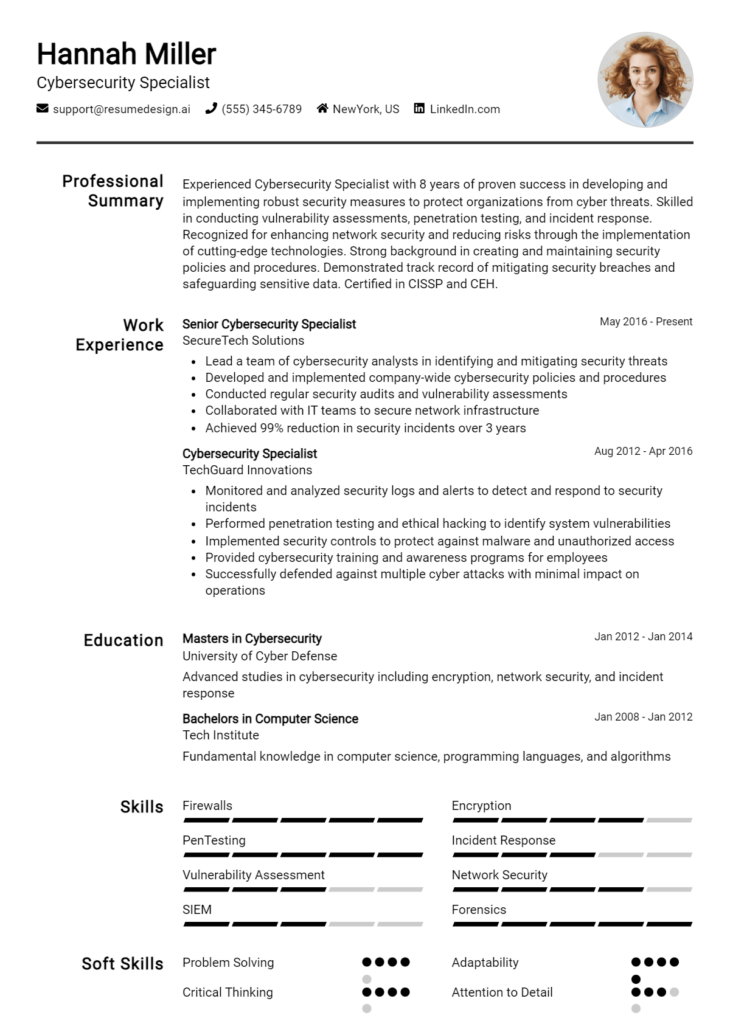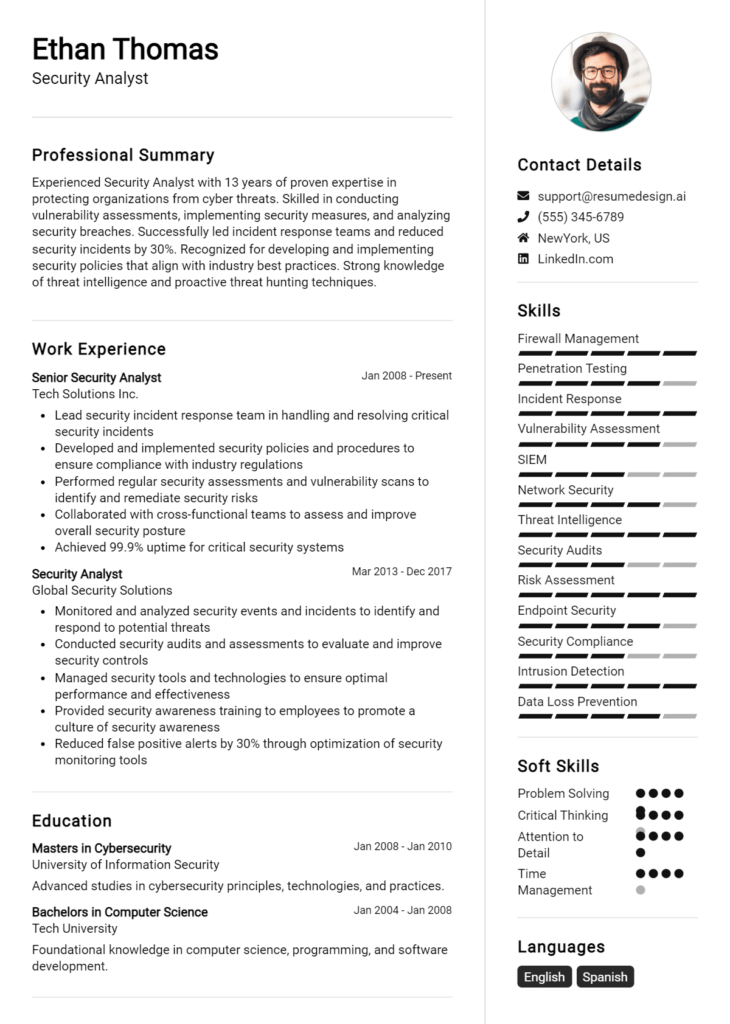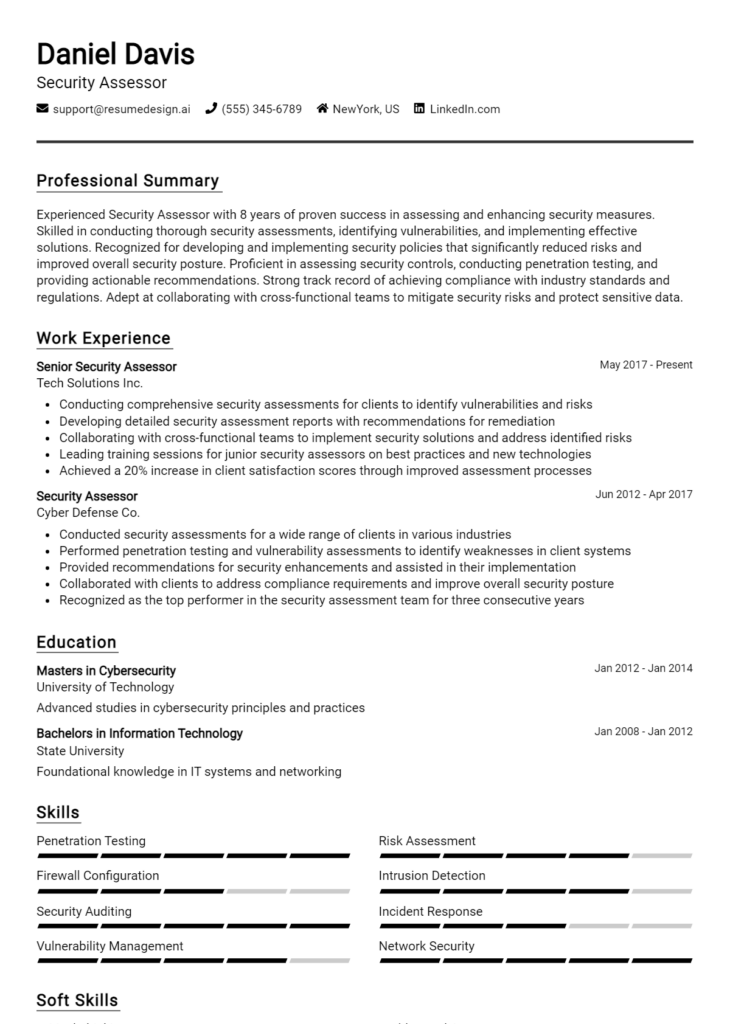Security Awareness Trainer Core Responsibilities
A Security Awareness Trainer plays a crucial role in fostering a culture of security within an organization. This professional is responsible for developing, implementing, and delivering training programs that enhance employees' awareness of security threats and best practices. Key skills include strong communication, technical proficiency, operational insight, and problem-solving abilities, enabling the trainer to effectively bridge various departments. These competencies contribute significantly to the organization's goals by reducing risk exposure. A well-structured resume can effectively highlight these qualifications, ensuring candidates stand out in this vital field.
Common Responsibilities Listed on Security Awareness Trainer Resume
- Design and deliver engaging security awareness training programs.
- Conduct assessments to identify security knowledge gaps among employees.
- Develop educational materials, including presentations and e-learning modules.
- Collaborate with IT and HR departments to ensure comprehensive training.
- Monitor and evaluate the effectiveness of training initiatives.
- Stay updated on the latest security threats and trends.
- Facilitate workshops and seminars to promote security best practices.
- Provide guidance on incident response and reporting procedures.
- Compile and present training metrics to management.
- Engage in continuous professional development in cybersecurity.
- Advocate for a security-conscious culture across all levels of the organization.
High-Level Resume Tips for Security Awareness Trainer Professionals
In today's job market, a well-crafted resume is crucial for Security Awareness Trainer professionals, as it serves as the first impression a candidate makes on potential employers. Your resume must effectively showcase not only your skills and qualifications but also your achievements in the field of security awareness training. A compelling resume can set you apart from the competition, demonstrating your ability to educate others on vital security practices and protocols. This guide will provide practical and actionable resume tips specifically tailored for Security Awareness Trainer professionals, helping you present your best self to prospective employers.
Top Resume Tips for Security Awareness Trainer Professionals
- Tailor your resume to the job description by using relevant keywords that reflect the specific requirements of the position.
- Highlight your experience in developing and delivering training programs related to security awareness and cyber threats.
- Quantify your achievements by including metrics such as the percentage of employees trained, improved awareness scores, or reduced incidents of security breaches.
- Showcase any certifications or credentials you hold related to information security or training, such as Certified Information Systems Security Professional (CISSP) or Certified Information Security Manager (CISM).
- Incorporate soft skills that are essential for trainers, such as communication, engagement, and adaptability, to demonstrate your effectiveness in delivering training.
- Include specific examples of training techniques you've used, such as hands-on simulations, e-learning modules, or workshops.
- Emphasize your knowledge of current security threats and trends to show that you are up-to-date with industry developments.
- List any experience with assessment tools or methods used to evaluate training effectiveness, demonstrating your commitment to continuous improvement.
- Be concise and organized, using bullet points for readability and ensuring your resume is easy to navigate for hiring managers.
By implementing these tips, you can significantly enhance your resume's effectiveness and increase your chances of landing a job in the Security Awareness Trainer field. A thoughtfully designed resume will not only showcase your qualifications but also convey your passion for educating others about the importance of security awareness, making you an attractive candidate for potential employers.
Why Resume Headlines & Titles are Important for Security Awareness Trainer
In the competitive field of security awareness training, a well-crafted resume headline or title serves as a critical first impression for hiring managers. It acts as a concise summary that encapsulates a candidate's key qualifications and competencies in a single impactful phrase. An effective headline not only grabs attention but also sets the tone for the entire resume, highlighting the applicant's unique value proposition. Therefore, it is essential that the headline is not only relevant to the role of a Security Awareness Trainer but also succinct, ensuring that it resonates with the specific job being applied for.
Best Practices for Crafting Resume Headlines for Security Awareness Trainer
- Keep it concise and to the point, ideally under 10 words.
- Be role-specific by including the title 'Security Awareness Trainer' in the headline.
- Highlight key qualifications or certifications relevant to the role.
- Use strong action words that convey expertise and authority.
- Avoid jargon that may not be understood by all hiring managers.
- Tailor the headline to match the specific job description and requirements.
- Incorporate measurable achievements or skills where possible.
- Make sure it reflects your personal brand and professional identity.
Example Resume Headlines for Security Awareness Trainer
Strong Resume Headlines
Certified Security Awareness Trainer with 5+ Years of Experience in Corporate Training
Dynamic Security Trainer Specializing in Cybersecurity Education and Compliance
Experienced Security Awareness Professional Focused on Reducing Human Error Risks
Engaging Security Awareness Educator with Proven Track Record in Employee Training
Weak Resume Headlines
Security Trainer
Experienced Professional Looking for Opportunities
Training Specialist
The strong headlines are effective because they are specific, highlighting key qualifications and conveying a sense of expertise that aligns with the role of a Security Awareness Trainer. They immediately inform hiring managers about the candidate’s experience and focus area, thus creating a compelling narrative. In contrast, the weak headlines lack specificity and fail to communicate any unique strengths or relevant experience, making them forgettable and ineffective in capturing attention. A strong headline not only enhances the candidate's visibility but also establishes a foundation for the rest of the resume content.
Writing an Exceptional Security Awareness Trainer Resume Summary
A well-crafted resume summary is essential for a Security Awareness Trainer, as it serves as the first impression for hiring managers. In a competitive job market, a strong summary quickly captures attention by succinctly showcasing key skills, relevant experience, and notable accomplishments. This introductory paragraph should be concise and impactful, emphasizing the candidate's ability to effectively educate and engage employees on security measures. A tailored summary that aligns with the specific job description will highlight the candidate's suitability for the role, setting the stage for further consideration in the hiring process.
Best Practices for Writing a Security Awareness Trainer Resume Summary
- Quantify Achievements: Use numbers to demonstrate the impact of your training programs, such as percentage improvements in security compliance.
- Focus on Skills: Highlight specific skills relevant to the role, such as knowledge of cybersecurity best practices, training methodologies, and communication skills.
- Tailor to the Job Description: Customize your summary to reflect the requirements and responsibilities outlined in the job posting.
- Use Action Verbs: Start sentences with strong action verbs to convey your contributions effectively.
- Be Concise: Aim for 3-5 sentences that convey your strengths without unnecessary fluff.
- Showcase Relevant Experience: Mention previous roles or training experiences that directly relate to security awareness.
- Highlight Certifications: Include any relevant certifications, such as Certified Information Systems Security Professional (CISSP) or Certified Information Security Manager (CISM).
- Demonstrate Passion: Convey your enthusiasm for promoting security awareness within organizations to engage potential employers.
Example Security Awareness Trainer Resume Summaries
Strong Resume Summaries
Dynamic Security Awareness Trainer with over 7 years of experience developing and implementing effective training programs that improved employee compliance by 40%. Skilled in creating engaging content and delivering presentations that enhance understanding of cybersecurity risks and best practices.
Results-driven Security Awareness Specialist with a proven track record of reducing phishing incident reports by 60% through targeted awareness initiatives and interactive workshops. Proficient in leveraging analytics to assess training effectiveness and adapt strategies accordingly.
Experienced Security Awareness Trainer with a strong background in adult education and a passion for cybersecurity. Successfully trained over 1,000 employees annually, achieving a 95% satisfaction rate on feedback surveys and significantly increasing overall security posture within the organization.
Weak Resume Summaries
Security Awareness Trainer with experience in training. I like to help people understand security issues.
A motivated professional looking for a position in security awareness training. I have some relevant skills but need more experience.
The strong resume summaries are considered effective because they provide specific details about the candidate's experiences, achievements, and relevant skills, all of which are quantifiable and tailored to the role. They highlight measurable outcomes and demonstrate the candidate's impact on previous organizations. In contrast, the weak summaries lack concrete examples and details, making them vague and unmemorable, which ultimately fails to capture the interest of hiring managers.
Work Experience Section for Security Awareness Trainer Resume
The work experience section of a Security Awareness Trainer resume is crucial as it serves as a testament to the candidate's technical skills and their ability to effectively manage teams while delivering high-quality training programs. This section not only highlights the practical experience gained in previous roles but also demonstrates the candidate's proficiency in aligning their efforts with industry standards. Emphasizing quantifiable achievements, such as the percentage of improved security awareness or successful training completion rates, is essential in illustrating the impact of their work. A well-crafted work experience section can significantly enhance the candidate’s appeal to potential employers.
Best Practices for Security Awareness Trainer Work Experience
- Use action verbs to describe responsibilities and achievements, ensuring clarity and impact.
- Quantify results wherever possible, such as percentage increases in employee awareness or reductions in security incidents.
- Highlight the use of specific security tools and technologies to showcase technical expertise.
- Demonstrate collaboration by mentioning cross-departmental training initiatives and teamwork.
- Include certifications and training methodologies to emphasize commitment to professional development.
- Tailor experiences to align with the job description, focusing on relevant skills and outcomes.
- Showcase leadership roles in training sessions, workshops, or security awareness campaigns.
- Utilize bullet points for readability, ensuring that key achievements stand out.
Example Work Experiences for Security Awareness Trainer
Strong Experiences
- Developed and implemented a security awareness training program that resulted in a 40% reduction in phishing incident reports within six months.
- Led a team of 5 trainers to deliver quarterly workshops on data protection best practices, achieving a 95% satisfaction rate from participants.
- Collaborated with IT and HR departments to integrate security training into the onboarding process, improving new employee compliance by 30%.
- Designed and executed an interactive online training module that increased employee engagement scores by 50% compared to previous formats.
Weak Experiences
- Conducted training sessions for staff on security issues.
- Worked with the team to improve security awareness.
- Helped create some materials for training purposes.
- Participated in discussions about security policies.
The examples of strong experiences demonstrate concrete, quantifiable outcomes and effective collaboration, showcasing the candidate's impact in their previous roles. In contrast, the weak experiences lack specificity and measurable results, making them less impressive and failing to convey the candidate's true capabilities. Strong experiences effectively illustrate the trainer's expertise and contributions, while weak experiences do not provide sufficient detail to engage potential employers.
Education and Certifications Section for Security Awareness Trainer Resume
The Education and Certifications section of a Security Awareness Trainer resume is crucial as it showcases the candidate’s academic foundation and specialized knowledge in the field of security training. This section not only highlights degrees earned and relevant certifications obtained but also reflects a commitment to continuous learning and professional development. Including pertinent coursework and specialized training enhances the candidate's credibility, demonstrating their alignment with the job requirements and their readiness to educate others on security best practices.
Best Practices for Security Awareness Trainer Education and Certifications
- Prioritize relevant degrees in fields such as Cybersecurity, Information Technology, or Education.
- List industry-recognized certifications, such as Certified Information Systems Security Professional (CISSP) or Certified Information Security Manager (CISM).
- Include specific coursework that pertains to security awareness, risk management, or adult education techniques.
- Highlight any ongoing education, such as workshops, webinars, or online courses related to cybersecurity and training methodologies.
- Use clear formatting to differentiate between degrees, certifications, and any specialized training.
- Be concise yet detailed enough to convey the relevance of each qualification to the Security Awareness Trainer role.
- Consider including any training or certifications in communication or instructional design that enhance training delivery skills.
- Regularly update this section to reflect any new qualifications or advancements in the field.
Example Education and Certifications for Security Awareness Trainer
Strong Examples
- Bachelor of Science in Cybersecurity from ABC University
- Certified Information Systems Security Professional (CISSP)
- Master’s Certificate in Adult Learning and Development
- Relevant coursework: Risk Management, Information Security Policies, and Adult Education Techniques
Weak Examples
- Bachelor of Arts in History
- Certification in Microsoft Office Suite
- High School Diploma
- Outdated CompTIA Security+ certification (obtained over 10 years ago)
The strong examples are considered such because they directly relate to the core competencies required for a Security Awareness Trainer, illustrating both relevant academic qualifications and current industry-recognized certifications. In contrast, the weak examples reflect outdated or irrelevant educational backgrounds and certifications that do not support the specific role of a Security Awareness Trainer, thereby diminishing the candidate's perceived expertise in the field.
Top Skills & Keywords for Security Awareness Trainer Resume
In the field of cybersecurity, the role of a Security Awareness Trainer is crucial for fostering a culture of security within an organization. A well-crafted resume for this position should highlight both hard and soft skills that illustrate the candidate's ability to educate and engage employees in security best practices. Employers look for trainers who not only possess technical knowledge but also have the interpersonal skills necessary to communicate effectively and influence behavior. Incorporating the right skills into your resume can significantly enhance your chances of landing a job in this vital area.
Top Hard & Soft Skills for Security Awareness Trainer
Soft Skills
- Communication Skills
- Empathy
- Presentation Skills
- Adaptability
- Leadership
- Problem-Solving
- Team Collaboration
- Active Listening
- Conflict Resolution
- Time Management
- Emotional Intelligence
- Engaging Storytelling
- Teaching Ability
- Patience
- Motivational Skills
Hard Skills
- Cybersecurity Fundamentals
- Risk Assessment Techniques
- Security Policy Development
- Incident Response Procedures
- Phishing Awareness Training
- Compliance Standards (e.g., GDPR, HIPAA)
- Learning Management Systems (LMS)
- Data Protection Regulations
- Digital Forensics Basics
- Social Engineering Tactics
- Security Frameworks (e.g., NIST, ISO)
- Threat Intelligence Analysis
- Malware Analysis
- Technical Writing
- Vulnerability Assessment Tools
- E-Learning Development
- Security Awareness Metrics
By emphasizing a blend of these skills on your resume, coupled with relevant work experience, you can effectively demonstrate your proficiency as a Security Awareness Trainer and your commitment to promoting a secure workplace.
Stand Out with a Winning Security Awareness Trainer Cover Letter
As a dedicated and experienced Security Awareness Trainer, I am excited to apply for the role at [Company Name]. With a strong background in cybersecurity education and a passion for promoting safe online practices, I am committed to fostering a culture of security awareness within organizations. My hands-on experience in developing engaging training programs and my ability to communicate complex security concepts in an accessible manner will help empower employees to recognize and mitigate potential threats.
In my previous role at [Previous Company Name], I successfully designed and implemented a comprehensive security awareness program that resulted in a 40% decrease in phishing incidents over six months. By utilizing interactive training modules, simulated phishing attacks, and real-time feedback, I was able to engage employees at all levels and reinforce essential security protocols. My proactive approach not only improved compliance but also created a shared sense of responsibility for protecting sensitive information.
Moreover, my strong interpersonal skills enable me to build rapport with diverse teams, facilitating open discussions about security challenges and encouraging a proactive mindset. I am adept at tailoring training sessions to meet the unique needs of different departments, ensuring that every employee, from IT to HR, understands their role in safeguarding the organization. I am enthusiastic about the opportunity to contribute to [Company Name]'s mission of maintaining a secure environment and enhancing organizational resilience.
I am eager to bring my expertise in security training and my commitment to continuous improvement to the Security Awareness Trainer position at [Company Name]. I look forward to the possibility of discussing how my skills and experiences align with your needs and how we can work together to create a safer workplace. Thank you for considering my application.
Common Mistakes to Avoid in a Security Awareness Trainer Resume
When crafting a resume for the role of a Security Awareness Trainer, it's essential to present your skills and experiences effectively to stand out in a competitive job market. However, many candidates make common mistakes that can detract from their qualifications and diminish their chances of landing an interview. Here are several pitfalls to avoid when creating your resume:
Lack of Tailoring: Sending out a generic resume without customizing it for the specific role can lead to missed opportunities. Employers appreciate candidates who take the time to align their skills with the job description.
Ignoring Keywords: Failing to incorporate relevant industry keywords can cause your resume to be overlooked by applicant tracking systems (ATS). Research the job posting and include essential terms related to security awareness training.
Overly Technical Language: Using jargon or overly complex terminology can alienate hiring managers who may not have a technical background. Aim for clear, concise language that effectively communicates your expertise.
Neglecting Soft Skills: Security Awareness Trainers require strong communication, interpersonal, and teaching skills. Omitting these essential soft skills can give an incomplete picture of your capabilities.
Listing Responsibilities Instead of Achievements: Simply stating your job responsibilities can make your resume feel flat. Focus on quantifiable achievements and the impact of your training programs to showcase your effectiveness.
Inconsistent Formatting: A resume that lacks a cohesive format can be difficult to read and appear unprofessional. Ensure consistent font sizes, bullet styles, and spacing throughout the document for a polished look.
Failing to Highlight Certifications: Relevant certifications, such as Certified Information Systems Security Professional (CISSP) or Certified Security Awareness Practitioner (CSAP), can enhance your credibility. Be sure to prominently display these credentials.
Omitting Continuous Learning: The field of cybersecurity is constantly evolving. Failing to mention ongoing education, training, or participation in industry events can make it seem like you are not keeping up with current trends and best practices.
Conclusion
In conclusion, a Security Awareness Trainer plays a crucial role in fostering a culture of security within an organization. Key responsibilities include developing training programs, conducting workshops, and providing continuous education to ensure employees are informed about the latest security threats and best practices. By emphasizing the importance of security awareness, trainers help mitigate risks and empower employees to recognize and respond to potential security incidents.
Now is the perfect time to review and enhance your resume to reflect your skills and experiences effectively. Utilize available resources to create a standout application. Consider using resume templates to structure your information professionally. If you're looking for a more guided approach, try the resume builder that simplifies the process and helps you craft an appealing resume tailored to your specific role. Additionally, explore resume examples for inspiration, and don’t forget to complement your resume with a strong introduction through cover letter templates.
Take action now and ensure your resume reflects your expertise as a Security Awareness Trainer, setting you up for success in your job search!

